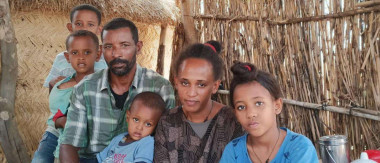“The horrifying scenes in Khartoum will forever haunt me.”
Sudan hosts one of the largest numbers of refugees in Africa, according to UNHCR. About 61 percent of refugees live in informal settlements, host communities, and urban areas, while 39 percent reside in camps, particularly in eastern Sudan and White Nile state in the south, where Doctors Without Borders/Médecins Sans Frontières (MSF) is providing medical and emergency support. For Ethiopian refugees like Salim* and Qamar*, who had already escaped violence in their homeland, their journey from Khartoum to east Sudan with their four children was fraught with risks.
